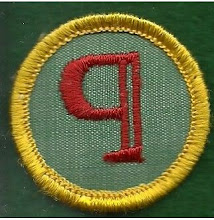I like offbeat punctuation marks, like the interrobang. I can see the crying need for the sarcasm point (an inverted exclamation point) and the pomma --“you’ve been punk’d” – point (an exclamation point lying on its side).
And I come up with the occasional oddball typo – this week it was “She was in an induced comma.”
How does one induce a comma?
Starting with a definition of terms -- because I was on the debate team in high school and the defintion-of-terms was always the first step in research. I get to visit my old friend, the American Heritage Dictionary (AHD). I love the AHD because I am a geeky closet linguist -- my, but that sounds naughty -- and the AHD gives the Indo-European roots of many words.
Induce means “1. To lead or move, as to a course of action, by influence or persuasion. 2. To bring about or stimulate the occurrence of; cause..." (There are other meanings for biochemistry and genetics). [Middle English inducen, from Old French inducer, from Latin indcere : in-, in; see in-2 + dcere, to lead; see deuk- in Indo-European roots.]
Finding the root words in English is a fun puzzle and deuk- is one of those roots that has dug in all over the language, forms the root of everything from the Middle English tuggen (to draw or lead) to the Latin ducere -- dock, deduce, introduce, it is also the root of the Latin educare -- lead out, bring up (educate) -- and intriguingly, the root of the Old English team (family, descendant, race, brood).
The definition of a comma, again from the AHD: 1. Grammar A punctuation mark ( , ) used to indicate a separation of ideas or of elements within the structure of a sentence. 2. A pause or separation; a caesura. 3. Any of several butterflies of the genus Polygonia, having wings with brownish coloring and irregularly notched edges. [Latin, from Greek komma, piece cut off, short clause, from koptein, to cut.]
And "coma" is from the Greek koma, a deep sleep. As in American English, a single "m" separates a pause from a sleep.
And as for using commas, I can't say it any better than The Comma Project --
“Put a comma in whenever you take a breath.
Almost everyone I know has heard that particular comma rule, or some variation of it, and that is unfortunate because the rule is unreliable at best and, at worst, simply wrong. But the rule does make sense in a historical context, and that may explain its longevity.
In antiquity, texts were usually read aloud or recited from memory by orators, and so the rule that you “put a comma in whenever you take a breath” can be traced back to the earliest days of reading and writing. Some of the words that we now use to refer to punctuation marks, such as comma, colon and period, originally referred to subparts of a text, differentiating them according to their length and complexity.
Before the arrival of alphabets, ancient texts could not be written out—they were memorized and passed along through an oral tradition. Once texts could be converted into written symbols, they were usually copied down letter for letter—with no punctuation, capitalization or even spacing between words.
Punctuation marks got their start as a way of sorting out the confusion by, for example, breaking material into longer and shorter sections. Back then writers didn’t have to worry about punctuation, which was determined not by the person who composed a work or copied it but by the one who spoke it out loud..."
_____________
For more on punctuation:
Pause and Effect: Punctuation in the West, by Malcolm B. Parkes
(This is an academic reference and is expensive!)

No comments:
Post a Comment